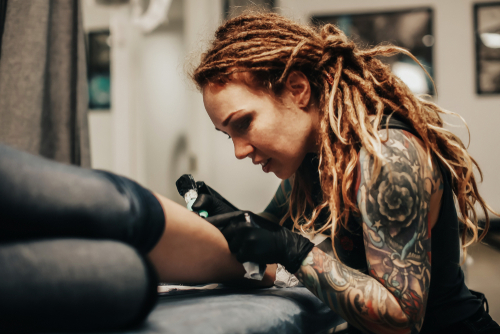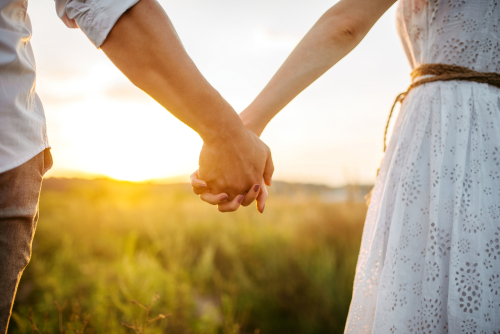Before you get inked, learn all about how tattoos can affect your relationship in Japan! The Japanese and tattoos don’t really get along. Most Japanese frown when they see someone with tattoos.
Having tattoos in Japan may not only affect your love life but also your job or even your reputation in the neighborhood!
- Related: Female Friendly tattoo Studios in Tokyo!
- Related: Best Japanese Tattoo Artist
So here’s everything you need to know about how tattoos can affect your relationship in Japan
Page Contents
How Japanese Tattoos Can Affect Your Relationship In Japan
The Japanese Tattoo History

Japan has a long history with tattoos and unfortunately, not the good kind. Tattoos were considered a punishment in the 7th century and were meted out to the rebels and the criminals.
Called Irezumi in Japanese, those who disobeyed the emperor were subjected to the painful pricks of a sharp needle attached to a wooden dowel.
This was performed manually and the ink stayed on as a reminder of the punishment, sort of like a branding. People who had this branding on their bodies were kept away from society and not socialized with, as they were the rebels and criminals.
This idea was certainly not helped by the Yakuza, a mafia-like organization in Japan.
The members of the organization tattooed themselves as an identity and indulged in a lot of cult-like rituals. Even today, the Japanese associate anyone with tattoos to be a part of the Yakuza gang.
While tattoos are so ordinary and normal in most parts of the world, we often wonder why the Japanese don’t really approve of them.
Knowing this history and how understanding that the idea has been ingrained in the minds of the people really does help see things from their perspective.
Getting a Tattoo in Japan is Considered as a Medical Procedure
Earlier this decade, a rule was passed in Osaka that tattoos can only be done by a medical practitioner.

Till date, many tattoo artists in Japan use the Irezumi style of tattooing where they use the wooden dowel with a needle attached. There are some tattooists who have adopted the western machine needle and ink as well.
Since the procedure involves a needle and piercing of the skin, it is considered illegal to be done by anyone who does not have a license.
A Change In The Japanese Attitude Towards Tattoos
With international trade becoming more and more important, the Japanese are now realizing that to encourage tourism they cannot be very strict when it comes to tattoos.
Especially with the Olympics and Paralympics hosted by the country in 2020 and the Rugby World Cup held in Japan in 2019, there has been a surge in the number of people visiting Japan and tourism is a major source of income for the country.
The government has realized that it is impractical to ban tourists who have tattoos. Tattoos are kind of a norm across the world and most tourists who visit Japan are sure to have at least a tiny one.
That has changed things slightly with many tourist attractions and hot springs across Japan. Most places still enforce rules that tattoos have to be hidden, so tourists who have them must cover them up using clothes or a bandage.
Despite the government encouraging tourist locations to be more flexible, there are still many beaches, hot springs, and other spas which strictly ban tattoos.
A good practice is to call ahead in advance and let the spa, hot spring, or tourist attraction know that you have a tattoo.
How Tattoos Can Affect Your Relationship in Japan
There are some men who might accept you immediately and probably even be intrigued that you have a tattoo.
However, don’t be surprised if you get rejected by a lot of men who consider tattoos a taboo. Many foriegn women find it hard to date Japanese men as the culture is quite traditional and men stay away from women who have tattoos.

Even if a man is genuinely interested in you, he might feel that the relationship may not be able to stand the test of his family and he might not ask you out.
There are some men who might stare at you or find your tattoos interesting. These men are probably not Japanese, or they are those Japanese who have tattoos themselves. These men tend to be more open-minded and well-traveled as well, so that’s often a great match.
Now, if you are lucky enough to find a man who does not have his own tattoo but is broadminded enough to date you, and you find the relationship getting more serious, you might have resistance from his family.
The Japanese are very family-oriented and weddings are a huge family affair. Marriages are conducted with the blessings of the entire family and most parents and grandparents will refuse such a match.
When it comes to marriage, families also think ahead, of the future.
You cannot really run away from family as there will be lots of occasions and events that you will be getting together for and a tattoo is definitely a deal-breaker.
Being a tightly knit community, the Japanese prioritize their reputation in society and at their workplace.
The parents and even the younger men worry that if they marry someone with a tattoo, their reputation amongst their friends and coworkers will be ruined and they will become a social outcasts.
Men also worry that if their place of work or their coworkers get to know that they are in a relationship with a partner who is having tattoos in Japan, it can affect the growth in their career.
This is often the case with many mixed cultures and mixed-race relationships where the Japanese partner succumbs to family pressure and breaks up the relationship.
You might also come across men who request you to get your tattoo removed if you want the relationship to be taken further.
Another kind you can come across are men who will date you but not consider you good enough to get married to.
These are men who consider tattooed women to be loose, which is honestly quite degrading.
In Japan, tattoos are supposed to be a sign of rebels or someone who is very strong-willed, and conservative or traditional men in Japan want a long-term relationship or a marriage with a woman who is just the opposite of that.
Getting a tattoo in Japan changes the way people look at you.
All of this might not sound fair, so it is always a good idea to speak about the tattoos you have with a potential partner and understand their take on it before you actually get into the relationship.
This will help avoid a lot of heartache in the future, and save you the time and energy you will be investing in the relationship.
Why are tattoos viewed negatively in Japan?
Tattoos are generally viewed negatively in Japan due to their association with organized crime, specifically the yakuza. Historically, yakuza members have used tattoos to display their loyalty to their gang and their criminal achievements. As a result, tattoos have become stigmatized in Japanese society and are often associated with criminal activity.
In addition, tattoos are also associated with a cultural taboo against altering one’s body. In traditional Japanese culture, the body is considered a sacred vessel and should not be altered in any way. Tattoos are seen as a violation of this cultural norm and can be viewed as disrespectful.
Furthermore, many public places such as hot springs, swimming pools, and gyms in Japan have rules against tattoos due to their association with yakuza and the negative image they carry. This has led to discrimination against people with tattoos and a general negative perception of tattoos in Japanese society.
Tattoos in the Workplace
First of all, finding certain jobs in Japan if you have a tattoo, can be quite hard.
Many offices and companies ban tattoos, but again, now with globalisation and more expats and foriegn students working in Japan.

Japanese organisations are becoming a little more flexible with their rules. This does not mean that you can walk in and flaunt your body art, though. You will still have to cover up your tattoos using long sleeved clothes, high collars or accessories like a scarf.
If they are in a place that is visible, cover it up with a bandage. These rules are put down in black and white and you will be signing your agreement when you take up the job so you don’t have a choice there.
Even if you don’t sign on it, it is something that is agreed upon by everybody in the workplace.
In a way, this might be a good thing to help you fit in initially as your co-workers will be more comfortable talking to you and socialising with you if your tattoos are not visible.
I know that people should accept you for the way you are, but it’s the Japanese culture and I think it’s alright to abide by their rules until they know you for who you are and you build a trusting relationship.
Tattoos in the Neighbourhood
While most workplaces and tourist attractions sometimes ban tattoos, there is nothing stopping you from taking a walk around your neighborhood showing off your inks.
Bear in mind that the Japanese consider tattoos to be worn by people who are untrustworthy, so you may not find your neighbours very friendly.
This is up to you, really. You could cover up your tattoos until you make some friends and build good relationships with those who live around you, or you could be yourself and be patient until they warm up to you.
Tips for Travelers with Tattoo in Japan
- Sometimes you might need to cover your tattoo in public places with plasters, bandages, etc. if they’re small.
- Check for online reviews for public places to see if they allow tattoos. Most people leave reviews of their experiences and that’s where you can find it out.
- If you want to visit onsen or bathe, it’s better to look for tattoo friendly onsens with private bath to avoid offending people.
- Make sure to cover up tattoos or don’t expose them in case they have obligatory or negative meanings that might hurt someone’s sentiment.
- Check for tattoo policies if you’re planning to stay at a ryokan. They’re not quite open to the idea of tattoo as they have public baths. You can also try calling them if you don’t find the policies.
How Tattoos Affect Relationships in Japan: FAQ
Can you show your tattoos in Japan?
You may want to consider covering up your tattoos when you go to Japan. You will not be allowed into any public bathing facilities or in any hot springs if you have tattoos. However, you will be able to enjoy Japan to the fullest if you cover them up or get them removed.
Why don’t the Japanese like tattoos?
Traditionally, tattoos are associated with yazuka (mafia) who were the largest criminal groups in Japanese history. However, the stigma is changing gradually, some orthodox Japanese still find them offensive.
What do the Japanese think of tattoos?
Tattoos aren’t considered polite and cause embarrassment in the Japanese society. They are banned in public places according to the rules. It’s considered safe to avoid public places if you have huge tattoos or to cover up with bandages or plasters in case you have a small one.
Why are tattoos stigmatized in Japan?
In Japan, tattoos are stigmatized and considered as a link to criminals, underworld, or as a mark of self-affirmation to be anti-social. They aren’t allowed in public spaces like Ryokans, onsens etc.
The Japanese are wary of people who have tattoos
Understanding the people who live around you can make it a lot easier.
Since the Japanese are brought up to think that anyone with a tattoo is associated with a gang or involved in criminal activity, they are wary of those who have body art and you may not immediately blend in or make friends.
But over time, they will understand that you’re not going to wield guns or knives at them and that you’re just an innocent neighbour who loves body art.
A lot of expats with tattoos say that it takes about 6 months to a year to settle in, but be yourself, smile at your neighbours and they will soon accept you and return the friendliness.





